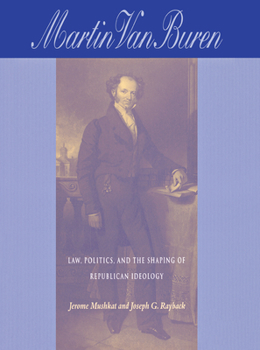Martin Van Buren
Select Format
Select Condition 
Book Overview
In 1828, Martin Van Buren discontinued his profession as a lawyer to become a full-time politician, yet his formative years as an attorney provided the critical ideological basis for his presidency. Mushkat and Rayback offer the first historical investigation of the nature, scope, and significance of Van Buren's legal practice as they trace the development of his republican ideology.
Rather than a static set of immutable values and imperatives, Van Buren's ideology was a malleable body of thought. Dynamic and evolving, it exemplified the complexities of republicanism itself. As a teenager, Van Buren absorbed Jefforson and Madison's eighteenth-century classical republicanism. Later, the principles of classical republicanism provided guides during his first years as a practicing lawyer. As his legal and political careers developed, Van Buren adapted his ideas to new conditions, accepting key components of liberal republicanism.
Van Buren's rise to prominence mirrors the relevance of law to politics. As a New York attorney, Van Buren worked with legal issues in the nation's most important state during the early nineteenth century. His key contributions were Americanization of the common law and modernization of contract law. His experience also helped shape his perspectives on such matters as the allocation and use of power, judicial activism and legislative supremacy, and property and gender rights.
Consulting a wide range of original legal sources not previously used by historians, Mushkat and Rayback offer a fresh and intriguing biographical approach to an American president that challenges traditional perceptions and adds new insight into Van Buren's place in American political and legal history.





